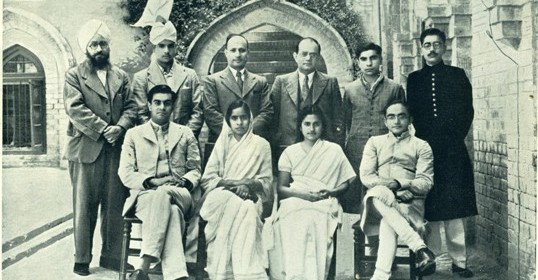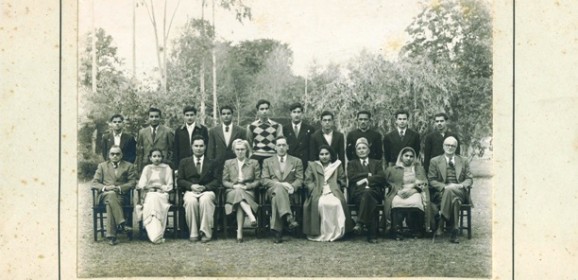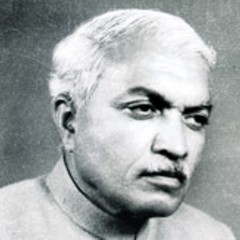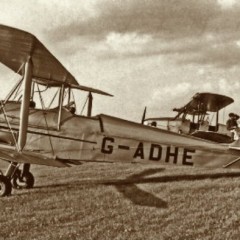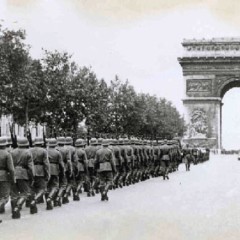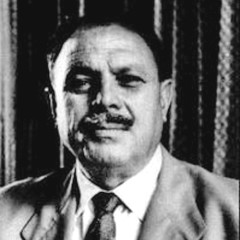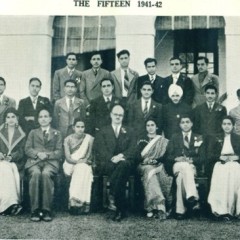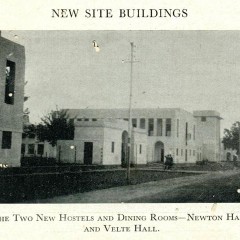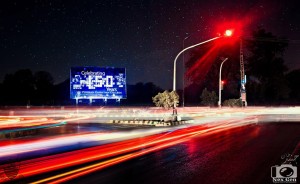The Making of a Revolutionary: Durga Das Khanna
For Durga Das Khanna, former Chairman, Punjab Legislative Council, the urge for freedom was sufficiently strong to take him quite close to the gallows. In 1931, he was sentenced to death by the Lahore Sessions Judge for his part in the conspiracy to assassinate the Governor of Punjab. He was acquitted later by the High Court. Scion of an orthodox family, Khanna became very close to Bhagat Singh and Sukhdev. In an interview recorded by the Nehru Memorial Library, eight years before his death in 1984, he describes how he was induced to give up his conservative moorings and drawn into the revolutionary band that sought to end the British rule in India by use of force: I belong to a family which had no political background. It was an orthodox Hindu family. I was born in 1908. My father and grandfather were doing money-lending business. One of my uncles was a senior advocate of the Lahore High Court. My reaction to the profession my father and grandfather were engaged in was rather adverse right from childhood. I remember people coming and being advanced all kinds of amounts and paying high rates of interest and I always used to wonder if my family was not living on the wants and miseries of others. This created almost a revolution in my mind, but I thought it wiser to keep my counsel to myself, though once or twice I did argue with my grandfather why he could not give up the profession. He said that this was something done not only by him, but by so many others and that it was a traditional way of helping people to carry out their needs. I had a religious bent of mind from the very beginning. My one attraction was the Guru Granth Sahib, which my father used to read daily. I began to visit the gurdwara, opposite Lahore Fort, which had been established in the memory of Guru Arjan Dev. Somehow of all the 10 gurus of the Sikhs, Guru Arjan Dev impressed me the most and I would go there every Sunday and listen to the bani [Sikh holy texts]. When I passed my matriculation in 1924 I applied to two colleges — Government College, Lahore, and Forman Christian College. I was not admitted in Government College and I am glad I was not. In FC College I found a very free atmosphere. The Principal, Dr E D Lucas, was a wonderful man and if I can think of the first influence on my mind about the national movement, it was from him. This, of course, does not take into account...
Message from Alumnus Flying Officer Turab Ali Khan Agha
December 1941 I am herewith sending you a few notes on my Civil Aviation career since leaving the College. I do hope you will forgive me for not including my flying duties with R.A.F. in which case I have to take special permit from A.H.Q. and I am afraid to do that; one has to apply at least a fortnight earlier. 1933 joined Europe’s famous Air Service Training School at Hamble, England. 1934 took part in the Isle of Wight Air Race and was placed third. 1934 was the first Indian to fly aircraft in the King’s Cup Air Race*. 1935 received Air Ministry’s Commercial ‘B’ Pilot’s licence. 1935-36 flew extensively all over European continent, North Africa, Middle East and Anatolia. 1937 joined Tata Air Line as pilot on regular routes in India and Ceylon. 1939 when war broke out was the first Indian ever to receive commission in the R.A.F.V.R.** as pilot. Have flown 30 different types of single and multi-engine aircraft which include high power service types. Approximately flown about 1,500 hours, covering 200,000 miles. Notes: * The King’s Cup Race was an annual British handicapped cross-country air race, run by the Royal Aero Club Records Racing and Rally Association and first contested in 1922. The event was open to British pilots only, but that did include members of the Commonwealth. The event was established by King George V as an incentive to the development of light aircraft and engine design. The first race was an 810-mile contest from Croydon Aerodrome, south of London, to Glasgow, Scotland and back again after an overnight stop. There were no races during World War II, and the contest did not resume until 1949. The race was abandoned in 1951, due to bad weather. [Edited from en.wikipedia.org] Records show that “T.A.K. Aga” flew a D.H.60G III Moth Major in the 1934 King’s Cup Race and was forced to land in Reading due to a fuel problem. [http://afleetingpeace.org/afp/the-kings-cup/about/64] ** Royal Air Force Volunteer Reserve Text and Photo: The Folio: FCC Magazine, Vol. XXXIII, No. 1 October-November 1941 Map: http://afleetingpeace.org/afp/the-kings-cup/about/64 Photo of aircraft: http://cdn-www.airliners.net/aviation-photos/photos/2/8/2/1645282.jpg...
FCC Alumna loses life in WWII
Miss Sarasvati Kitchlu whose collegiate career was wholly with us from Intermediate to the M.Sc. and who for a short time filled the post of Demonstrator in Physics on our Staff, went abroad three years ago to the Madame Curie Institute in Paris. She worked at the Institute until the fall of France, when she was arrested and taken to a concentration camp. She, however, was released and found her way to Lisbon. During her passage from Lisbon to England her boat was torpedoed and she lost her life. Source: The Forman Alumnus: News Bulletin and Magazine of the Forman Christian College Alumni Association, Vol II, No 1, December 1941. Image: http://simple-living-in-suffolk.co.uk/wp-content/uploads/2011/11/111111arc1940.jpg...
President’s Speech at FCC Centenary
The following speech was given by President Ayub Khan on the occasion of the Centenary Ceremony at F C College on 28 November 1964. Mr Governor, Mr Principal, Ladies and Gentlemen: It gives me special pleasure to be associated with the centenary celebrations of the Forman Christian College, Lahore. In the case of the students and staff of this college, joy must be mixed with pride and satisfaction at the completion of a hundred years of very useful service to the cause of education. May I extend to you all my sincerest congratulations on this happy occasion. I am very much impressed by the fact that the Forman Christian College, through its hundred years of beneficent existence, has set a very worthy example of the good that can be accomplished by a noble band of dedicated men imbued with a highly developed sense of public service. It is gratifying to know that the high ideals of the Founder continue to animate his successors – past and present. It is no doubt due to those lofty ideals that your college has acquired a worthy reputation for itself. The achievements of this college, your constant endeavour to add to those achievements, and your high traditions will no doubt inspire the present and coming generations for still greater effort. The educational institutions of this sub-Continent should no longer be content with turning out literate persons fit only to seek jobs. With the coming of Independence, they must equip the young men and women of this rising nation to meet the challenge of the needs of socio-economic development. We have arrived late on the scene of international competition. We have, therefore, got much leeway to make up. It requires special effort on the part of the youth of the nation and its tutors. Hard work, devotion to studies and noble ideals must be inculcated and practised if we are to hold our own in this highly competitive world. The rising generation also needs faith and courage to enter the struggle of life for the sake of its own future and that of its country. Faith and courage require a moral and spiritual base in the human mind and character. Fortunately our own spiritual and cultural heritage, if properly inculcated into the new generations, can well equip them for the vicissitudes of life. Before I conclude, I would like to refer to the proposal to put up a Centenary Hall to commemorate this occasion. I think it is an excellent idea. I have the clearance from the Government to offer Rupees one lakh. But I think this is not enough; so I will persuade...
Earliest Student Societies
The oldest society of the college is the Debating Society, established in 1887. It organised debates on topics which, surprisingly enough, were mostly political. One topic for a debate in 1905 was: “Resolved that the Indian National Congress has done more harm than good”. (The motion, when put to vote, was carried.) We also find mention of two rival societies, the Academical Society and the Gladstonians. Every year the two societies met at an annual debate which was a popular and much-awaited function. There was a Cosmopolitan Society which met every Saturday in Dr Griswold’s room and whose subscription was one anna per month. The Social Service League was founded in 1907 by Mr Fleming. It had no office-bearers and each member was supposed to render some social service every week and report it to the society. These were published in the Folio. Social work meant anything from reading books to the illiterate to persuading people to give up smoking. A proud report ran like this. “I read Fasan-i-Azad loudly to others in order to impress upon them the bad effects of opium-taking.” A Temperance Society was formed, though we wish to believe it was not needed. Two literary societies were formed in 1889. In 1914-15, we are told, there was a big crop of “crazy gangs” in the college. But, alas, only a few, like “Chaudhary Brotherhood,” “Mota Club” (what weight they carried in college politics we do not know), “Laughing Club” and “Ugly Club” (was membership open or secret?) are mention in the college journal. The Science Society organised by Mr Shah and Mr Benade was formed in 1915. Next year the most illustrious club, the “Fifteen”, was organised. Its membership was coveted by every student for it consisted of only the best. Essentially a literary group , it produced a number of writers and intellectuals. There was also a “Fiverise” Society founded in 1916 whose first Secretary was G. L. Nanda, now the Indian Home Minister. A Speakers’ Union was formed in 1919, and Literary Society founded by Mr M. S. Bhatty. The same year the “Economics Club” and the Rice Philosophical Union were established. The Dramatic Club was organised in 1942, although in many later issues of the college magazine the question was anxiously asked: “Where is the Dramatic Club?” The same question is being asked today. The Griswold History Society came into being in 1923 and Urdu Society in 1924. There is a mention of a Co-operative Sales Society in 1919 with Mr Benade as the man in charge. Its share was valued at Re. 1 and it was compulsory for all students and...
My Visit to the Camp
It was in the year 1937 that I came for my B.A. in the Forman Christian College. It was a remarkable change for I had shifted from a “pathshala” to a college, a college which is a college in every sense of the word. Since then I have been proud of it. But I have often felt inferior for I have a disqualification which I have always hesitated to disclose. All these years I have tried to hide the fact that I am not an “Old Camper.” I had never gone to the new site though I had read and heard much about it and knew everything about the new scheme of the authorities. Two camps had been held but I had yet to see what a camp was and what the new site looked like. It was one afternoon in the last week of March this year. I was sitting in a corner of the English seminar, turning the pages of The Cambridge History of English Literature, when suddenly a friend walked in with the news that Dr. Velte had been kind enough to postpone our examinations to the second fortnight of May. What a heartening news it was! It was a pleasant surprise. We all closed our books, and how to celebrate the good news became the topic of discussion. Some were in favour of going to see “Zindagi,” others were very emphatic in putting forward the claims of “Ninotchka.” I, being a non-camper, of course, was for paying a visit to the camp. My suggestion was not appreciated so I found myself among a microscopic minority. The musical sound of the library clock announced three and we were on our legs. I got only one companion and we both made our way to the camp. Cycling through Lawrence Gardens, in ten minutes we were on the Jail Road. A few minutes after we had taken the turn along the canal, I at once noticed the College flag flying high, a number of tents, some beautiful white buildings and bungalows and a small pillar enclosing a vast area of land. This sight revived in me the experiences of my childhood when in 1923 I had seen the beautiful city of New Delhi being erected in nearly similar conditions and surroundings. A crossing over the canal brought us to the “Forman Christian College Estate.” We did not know that Mr. Speers had succeeded by then in getting a fine pakka road leading direct to the main building of the College. As were going round the buildings, I saw a yellowish white car in the distance. I thought that...

